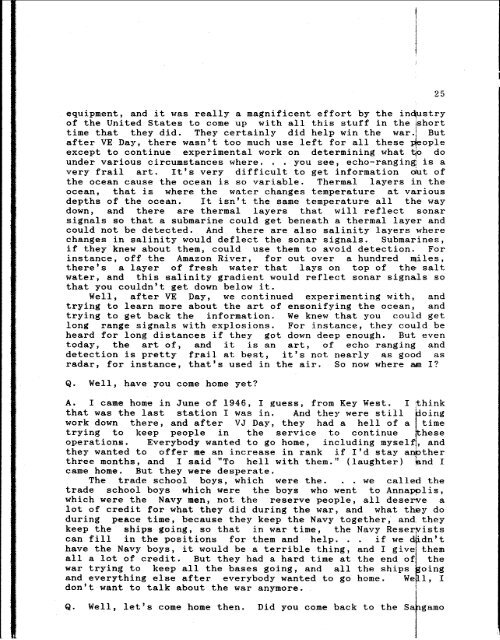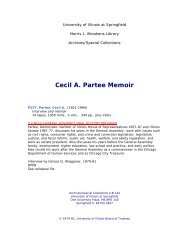Charles C. Patton Memoir - University of Illinois Springfield
Charles C. Patton Memoir - University of Illinois Springfield
Charles C. Patton Memoir - University of Illinois Springfield
Create successful ePaper yourself
Turn your PDF publications into a flip-book with our unique Google optimized e-Paper software.
equipment, and it was really a magnificent effort by the inwstry<br />
<strong>of</strong> the United States ta come up with all this stuff in the 'short<br />
time that they did. They certainly did help win the war./ But<br />
after VE Day, there wasn't too much use left for all these +ople<br />
except to continue experimental work on determining what tp do<br />
under various circumstances where. . . you see, echo-rangink is a<br />
very frail art. It's very difficult to get information dut <strong>of</strong><br />
the ocean cause the ocean is so variable. Thermal layers in the<br />
ocean, that is where the water changes temperature at various<br />
depths <strong>of</strong> the ocean. It isn't the same temperature all the way<br />
down, and there are thermal layers that will reflect sonar<br />
signals so that a submarine could get beneath a thermal layer and<br />
could not be detected. And there are also salinity layers where<br />
changes in salinity would deflect the sonar signals. Submarines,<br />
if they knew about them, could use them to avoid detection. Far<br />
instance, <strong>of</strong>f the Amazon River, for out over a hundred miles,<br />
there's a layer <strong>of</strong> fresh water that lays on top <strong>of</strong> the salt<br />
water, and this salinity gradient would reflect sonar signals so<br />
that you couldn't get down below it.<br />
Well, after VE Day, we continued experimenting with, and<br />
trying to learn more about the art <strong>of</strong> ensonifying the ocean, and<br />
trying to get back the information. We knew that you could get<br />
long range signals with explosions, For instance, they could be<br />
heard for long distances if they got down deep enough. But even<br />
today, the art <strong>of</strong>, and it is an art, <strong>of</strong> echo ranging and<br />
detection is pretty frail at best, it's not nearly as good as<br />
radar, for instance, that's used in the air. So now where m I?<br />
Q. Well, have you come home yet?<br />
A. I came home in June <strong>of</strong> 1946, I guess, from Key West. I think<br />
that was the last station I was in. And they were still<br />
work down there, and after VJ Day, they had a hell <strong>of</strong> a<br />
trying to keep people in the service to continue<br />
operations. Everybody wanted to go home, including<br />
they wanted to <strong>of</strong>fer me an increase in rank if I'd stay anpther<br />
three months, and I said "To hell with them." (laughter) bind I<br />
came home. But they were desperate.<br />
The trade school boys, which were the. . . we called the<br />
trade school boys which were the boys who went to Annapplis,<br />
which were the Navy men, not the reserve people, all deserve a<br />
lot <strong>of</strong> credit for what they did during the war, and what they do<br />
during peace time, because they keep the Navy together, and they<br />
keep the ships going, so that in war time, the Navy Reservists<br />
can fill in the positions for them and help. . .<br />
I<br />
if we d'dn't<br />
have the Navy boys, it would be a terrible thing, and I give them<br />
all a lot <strong>of</strong> credit. But they had a hard time at the end <strong>of</strong> the<br />
war trying to keep all the bases going, and all the ships oing<br />
and everything else after everybody wanted to go home. We I 1, I<br />
don't want to talk about the war anymore.<br />
Q. Well, let's come home then. Did you come back to the Sa gamo<br />
b

















